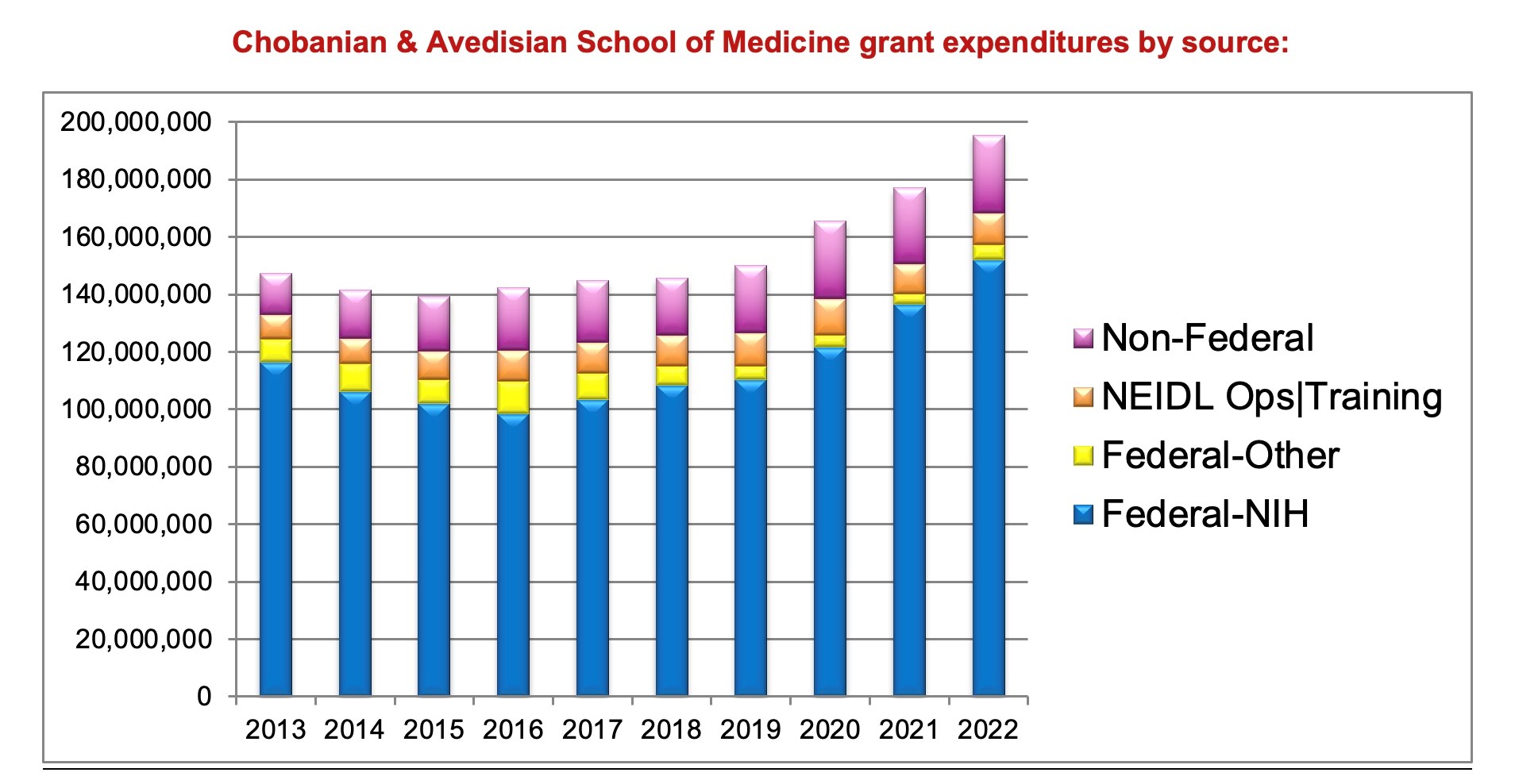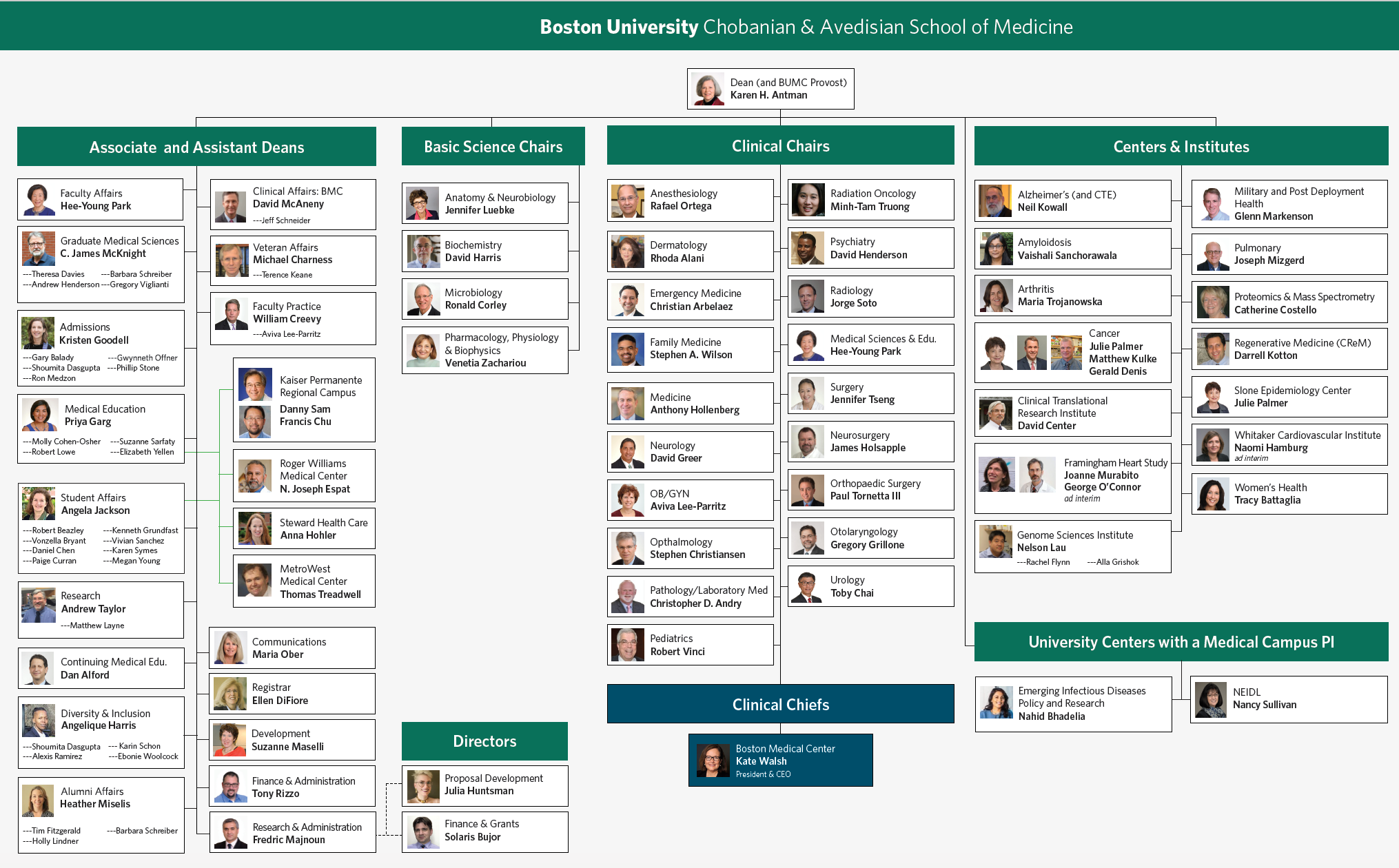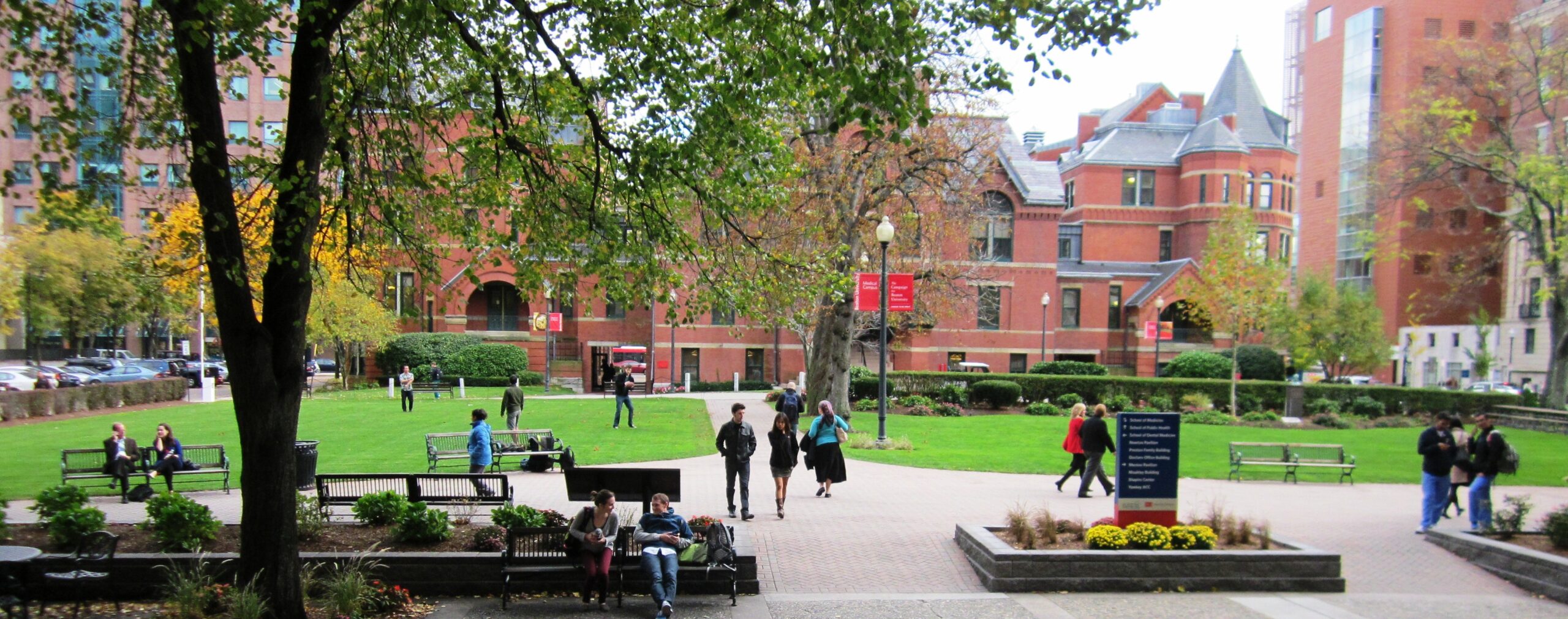Chair, Department of Anatomy & Neurobiology (A&N)
Access the PDF
| Reporting | Department Chairs report to the Dean of the School of Medicine |
| Website: Boston University | https://www.bu.edu/about/ |
| Website: School | https://www.bumc.bu.edu/camed/ |
| Website: Department | https://www.bumc.bu.edu/anatneuro/ |
Position Overview and Opportunity
The BU Chobanian & Avedisian School of Medicine seeks an exceptional leader to serve as Chair, Department of Anatomy & Neurobiology. The department includes laboratory and office space on the Boston University Medical Campus (BUMC).
This position offers candidates the unique opportunity of leading a dynamic department through its continued expansion.
The Chair will be a major institutional leader and must be a passionate advocate for their department’s staff and faculty. Working with the Dean’s Office, the successful candidate will have the opportunity to expand on an already strong foundation of research and education excellence to continue to build a nationally and internationally renowned department, serving as an advocate within the university for its numerous missions.
The successful Chair must bring vision to drafting the department’s future, coupled with a leadership style that inspires others. Above all, the Chair will be a consensus builder and agent for change in an era where the research enterprise is undergoing innovation and transformation nationwide.
Procedure for Candidacy
The Search Committee will begin reviewing candidates immediately and will continue until the position is filled. Applicants should send the following electronically to CAMedDean@bu.edu:
- a letter of interest that highlights the applicant’s vision for the department and relevant leadership experience,
- an NIH biosketch with research contributions and
- a full curriculum vitae.
Core Responsibilities
- Recruit, hire, and retain outstanding and diverse faculty.
- Support and promote Anatomy & Neurobiology faculty at the university, national, and international level.
- Lead the department’s research and education programs.
- Foster a collegial environment within the department.
- Promote collaborations.
- Define and implement strategies that expand and strengthen the department’s substantial research portfolio.
- Manage the department’s budget and ensure compliance with grant and institutional guidelines.
Critical Success Factors
Department leadership will be evaluated annually based on:
- Department growth in research funding and accomplishments when compared with similar departments nationally and with concurrent changes in the NIH budget.
- Quality of the department’s educational and research programs for medical and graduate students, postdoctoral fellows, and other trainees.
- Fiscal responsibility (balanced budget).
- Appropriate use of research space resources (F&A/square foot).
- Faculty development within the department.
- Collaborations with other departments and programs.
- Diversity of students and faculty; commitment to equity for all.
- Departmental citizenship and service on school committees.
Qualifications
Education
The successful candidate will have earned a PhD, MD, MD/PhD or equivalent and have at least 13 years of experience post terminal degree.
Experience
- Demonstrated track record of leadership and management gained within a medical department, research intensive university, or institute.
- NIH funded research background in anatomy or neurobiology.
- Strong organizational, financial, and budgetary skills that enable long-term planning towards strategic and tactical department goals.
- Success in mentoring and developing outstanding talent towards research and academic success.
- A strong record of research accomplishments and productivity including publications in leading peer-reviewed journals.
Personal Characteristics
- A clear strategic vision for department development.
- Demonstrated political acumen to address the needs of diverse stakeholders.
- A collaborative approach and willingness to take an institutional view of goals.
- Excellent communication skills across diverse audiences.
The Department of Anatomy & Neurobiology
Anatomy & Neurobiology (A&N) is one of four basic science departments within the Boston University Chobanian & Avedisian School of Medicine. Our research mission is to advance knowledge of systems, cellular and clinical and translational neuroscience with a focus on the structure and function of central nervous system circuits in health and disease across the lifespan. Our teaching mission is to educate graduate students and medical and dental students in neuroscience, gross anatomy, and histology, and concurrently prepare the next generation of biomedical/neuroscience researchers and educators for the 21st century.
History and Contributions to the Field: With roots dating from 1879 when Dr. Caroline Hastings became the first Chair of Anatomy, the Department of Anatomy & Neurobiology has been nationally recognized for its strong research programs in neuroscience and its innovative discoveries spanning seven decades. These include: 1) the first characterization of the fine structure of neurons, 2) the first description of abnormal brain morphology in autism and dyslexia, 3) comprehensive and detailed mapping of the organization and connectivity of neocortical circuits, 4) the description of the nature of memory loss in Alzheimer’s Disease, and 5) the discovery of the principal neuropathologies of normal brain aging.
Research: The department’s 20 research faculty engage in systems and clinical and translational neuroscience research in humans and in animal models ranging from rodents to non-human primates. Department faculty have successfully competed for more than $60M in research funding as principal investigators over the past 5 years.
Using state-of-the-art methodologies, these investigations center on understanding the structure, organization, development, and function of the central nervous system in health and disease. Specific studies focus on the nature of cortical circuits underlying cognition and memory, the neural basis of cognitive decline in aging and age-related disorders, the pathogenesis of neurodegenerative disease, the effects of stress on the brain, cortical development and developmental disorders, and mechanisms of neuronal plasticity that underlie cognition and recovery of function after brain damage.
Education: This department has a national reputation for its educational and teaching expertise. In the Medical School, our faculty direct many modules in the new, integrated foundational science medical curriculum and teach in nearly all modules. Department faculty also play a major role in the first year Dental School curriculum and teach more than 30 graduate courses within the school’s Graduate Medical Sciences.
The teaching excellence of the department is affirmed by a variety of metrics including the receipt of an unprecedented 24 teaching awards over the last 15 years, including the highest awards at the school and at Boston University. Our senior faculty enlist and mentor junior faculty members and graduate students to collaboratively teach our medical, dental, and graduate student courses. As a result, our program is widely recognized as a source of respected and highly competent young educators in the biomedical sciences.
Graduate Programs: The department has a long-standing Doctor of Anatomy & Neurobiology program that provides trainees with the knowledge base and skills to become proficient in basic biomedical research and to develop outstanding pedagogic skills. Our PhD graduates have moved on to productive careers as biomedical researchers in the neurosciences and in anatomy and as outstanding educators in the biomedical sciences. The department also awards a Master’s degree (Vesalius program) that in addition to educating students in the anatomic and neurobiological sciences, trains students to be first-rate educators in these fields.
Campus Wide Climate and Resources
Research at Boston University Medical Campus is supported by excellent core facilities (BUMC research cores). Our diverse research strengths on campus include the nationally and internationally recognized National Emerging Infectious Diseases Laboratories (NEIDL), Pulmonary Center, Center for Regenerative Medicine, Framingham Heart Study, Chronic Traumatic Encephalopathy Center, and Alzheimer’s Disease Research Center.
Boston University also houses nationally renowned programs, including Biomedical Engineering, Center for Integrated Life Science Engineering, Photonics Center, Neurophotonics Center and the newly established Data & Computer Sciences Center.
The school recently received a $100M endowment to support medical and research excellence, and maintains a close relationship with its affiliate, Boston Medical Center (BMC), the northeast’s largest safety net hospital also co-located on the Medical Campus. This relationship further facilitates collaborative research with investigators at the forefront of patient care.
Boston University’s Chobanian & Avedisian School of Medicine
https://www.bumc.bu.edu/camed/
Established in 1848, the BU Chobanian & Avedisian School of Medicine, originally named the New England Female Medical College, was the first institution in the US to formally educate women physicians. It became the BU School of Medicine when it became co-educational in 1873. The school graduated the first Black American woman physician in the United States, Dr. Rebecca Lee Crumpler in 1864, and the first Native American physician, Dr. Charles Eastman in 1890. The school did not exclude outstanding applicants because of sex or ancestry and has not needed to change the names of any buildings.
Today, the school ranks No. 32 in Best Medical Schools (Research) in the 2023 edition of U.S. News & World Report. The school continues to make critical investments to strengthen its cutting- edge research and capabilities, particularly interdisciplinary approaches to discovery and innovation. A critical success factor in expanding these changes is the recruitment of a new Chair of the Department of Anatomy & Neurobiology.
The school, as shared in its mission statement, is dedicated to the educational, intellectual, professional, and personal development of a diverse group of exceptional students, trainees, and faculty who are deeply committed to the study and practice of medicine, to biomedical research, and to public health.
Its values include inclusive excellence, integrity, service, social justice, collegiality, equality of opportunity, and interdisciplinary collaboration.
The school supports all aspects of biomedical research, from basic exploration to outcomes research, with particular emphasis on interdisciplinary translational collaborations between bench and bedside.
We are committed to fostering the development of the next generation of exceptional biomedical scientists currently enrolled in Master’s and PhD programs, as well as medical and dental students.
Compensation and Equal Opportunity
Compensation arrangements are competitive and commensurate with both experience and achievement. Boston University is an equal opportunity employer, and all qualified applicants will receive consideration for employment without regard to race, color, religion, sex, sexual orientation, gender identity, national origin, disability status, protected veteran status, or any other characteristic protected by law.



